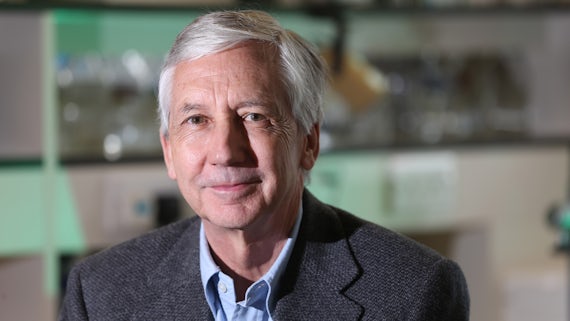Cyhoeddi'r seren wyddoniaeth gyntaf i Gymru
17 Mehefin 2013

A world-leading neurobiologist who will take up a post at the University as the first appointment under the Welsh Government's £50M flagship science initiative has been welcomed to Wales and Cardiff by First Minister for Wales and the Minister for Economy & Science.
Yves Barde, from the Biozentrum at the University of Basel, will join Cardiff School of Biosciences through the Sêr Cymru science initiative, taking up the position of Sêr Cymru Research Chair in Neurobiology.
The Sêr Cymru campaign aims to enhance research excellence by attracting world-class science researchers and their teams to Wales to increase Wales' share of funding from UK Research Councils as well as from the European Union.
First Minister, Carwyn Jones, said: "I am delighted to welcome Professor Barde to Wales as the first appointment under our Sêr Cymru programme. He will help build a world- leading research group at Cardiff University, whose work will be valuable in drug discovery and to clinical medicine and the NHS in Wales."
Economy and Science Minister, Edwina Hart, said: "Professor Barde brings a wealth of experience and is a world renowned innovator in the field of neurobiology. He will lead a strong team at Cardiff University and their work will be a great boost to life sciences and health research in Wales.
"A strong science research capability is vital to improving our economic wellbeing and securing a prosperous, healthy and sustainable future for Wales.
"We already have a lot to be proud of in science and innovation in Wales but the Ser Cymru programme will help us build on that to develop a dynamic and strong base in Wales."
The Professor's biggest breakthrough was the discovery and cloning of a protein that has been shown to be essential for a number of processes, including memory in humans. This vital brain protein, known as the brain-derived neurotrophic factor (BDNF), is needed for the development and maintenance of a healthy nervous system.
The cloning of the gene allowed the demonstration of several essential roles of BDNF in the function as well as in dysfunction of the brain.
His work also led to the identification of a family of related proteins - the neurotrophins.
More recently, he and his colleagues in Basel focused on drugs that are already used in the clinic that diffuses into the brain and increase BDNF levels in specific brain areas. One of these new drugs includes fingolimod recently introduced as the first oral treatment of multiple sclerosis.
Professor Barde will take up his post in September 2013 when he will continue his research into BDNF and neurotrophins.
Speaking about his new appointment, Professor Yves Barde said: "The Ser Cymru programme is a truly wonderful and remarkable initiative and has provided me with the opportunity to work with researchers who are at the forefront of research in stem cells and neuroscience.
"Some of the work I'll be undertaking in Cardiff will be about understanding the meaning of the link between the nervous system and neurological diseases which currently remains pretty mysterious, particularly in the case of depression. But alongside several outstanding research groups at Cardiff University, I will also aim to advance research using embryonic stem cells and reprogrammed somatic cells to advance understanding of neuronal dysfunction.
"This is a really exciting time for me, and for advances in neurobiology and for science in Wales."
Vice-Chancellor, Professor Colin Riordan believes Professor Yves Barde's appointment will help consolidate an already strong track-record in neuroscience and stem cell research.
He said: "It is a testament to the University's existing strengths in neuroscience and stem cell research that we are able to attract a scientist of Professor Barde's calibre. By working with others in his field, Professor Barde will be able to help Cardiff University tackle some of the biggest health challenges of our time."
Professor Ole Petersen FRS, Director of the School of Biosciences, said: "This is a very exciting moment in the history of the School of Biosciences. Not only have we been able to attract a world class superstar to come to the School of Biosciences but we also have the prospect of seeing some superior science being conducted here. The synergy with Professor Alun Davies FRS is particularly promising.
"Professor Barde is responsible for many important discoveries and fundamental concepts in the field of neurobioogy. In addition to his groundbreaking work on BDNF and neurotrophins, Yves has discovered many important developmental principles and molecular mechanisms in the nervous system that were iconoclastic and controversial when first proposed, but are now mainstream.
"To this day, Yves continues to make major advances in the field of neuroscience, such as his recent work on stem cell biology in the nervous system."
About Professor Barde
Professor Barde's original paper on BDNF was published in Nature in 1989. It has since been cited more than 1100 times in the scientific literature.
Professor Barde has been recognized by many organizations: he is a Member of EMBO, received the IPSEN Award and the Charles A Dana award in 1994, and the prestigious Perl UNC Neuroscience Prize in 2004. He is a member of the editorial board of NEURON (together with Nature Neuroscience the most highly rated neuroscience journal) and is, most importantly, an External Scientific Member of the Max Planck Institute for Neurobiology in Martinsried, Munich.
He is a former Director of that Max Planck Institute which he left following an offer to become Director of the Friedrich Miescher Institute in Basel, before becoming Professor of Neurobiology at the Biozentrum in Basel, a leading research institution in Switzerland.